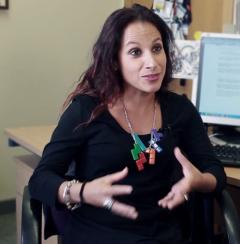Guest Blog with Dr Marisa De Andrade - Cabaret of Dangerous Ideas
Dr Marisa De Andrade is a lecturer in the University’s School of Health in Social Science (HiSS) and an Associate Director of the Centre for Creative-Relational Inquiry (CCRI). She brings her creative background in radio presenting, journalism and performing arts to health policy and practice. Along with an inter-disciplinary team in HiSS, she may have another trick up her sleeve – keep your eyes peeled for a new cutting-edge MSc in Health Humanities & Arts launching in 2018 (subject to College approval). Her show ‘Measuring Humanity’ is part of the 2017 Cabaret of Dangerous Ideas.

Can you explain a little bit about your show- what can people expect to see at it? Will it surprise them? What is ‘measuring humanity’ anyway?!
Measuring Humanity questions ‘what is evidence’? It puts forward that the arts – all forms of art and the act of humans coming together – is a type of ‘evidence’ that can be systematically captured and used to ‘measure’ changes in health, wellbeing and inequalities. It’s a way of thinking, a way of being, a way of doing, a way of collecting data, a way of objectifying the subjective – a show about accessing ‘truth’ from diverse communities through creative community engagement. And then convincing policymakers that sometimes the only way we can access ‘truth’ and ‘evidence’ from the most marginalised in our society is through the arts.
What would you say are the challenges in this area of research?
It can be challenging to convince some academics, funders, policymakers, health bodies – those who hold the purse strings – that the creative and relational are just as important as quantitative measures in health, wellbeing and social justice. ‘Validating the feels’ – or getting these approaches ‘quality assured’ – calls for a reconceptualization of the evidence-base as you’re trying to represent community members’ lived experiences. And as our experiences can be radically different, how do you turn this into a statistic to legislate at the population level? On a personal level, I spend a lot of time immersed in these communities building relationships (and having fun). At times though, it’s tough to see and hear stories and ‘realities’ of the most marginalised and disadvantaged groups and individuals. The challenges of our time are all too real.
What would you like your audience to take away with them from the show?
For the thinking behind Measuring Humanity to permeate into the way in which we live and understand health, wellbeing and inequity so we can all take action – through creative non-threatening mediums – to address the challenges of our time. To reflect on how solidarity is linked to health and equity. To reflect on global inequalities and the role we play in maintaining or even exacerbating them. And to start thinking about ‘evidence’ differently – music, art and creativity are a part of this inquiry! How can creative approaches challenge structural causes of inequality?
How is the University contributing to the new research and conversation?
Measuring Humanity is calling for something magical – a paradigm shift that situates creativity and relationships right next to positivist approaches in the evidence-base. We’re making lots of space in HiSS to develop capacity for debate, thinking and activity that argues for and contributes to the future of such interdisciplinary qualitative inquiry within the University, nationally and internationally through our new research Centre for Creative-Relational Inquiry
Our School has a long tradition of using humanities and arts approaches in working with health, wellbeing and ill-health experiences and in its research methodologies and methods. Now we’re taking an exciting next step – watch this space for a new cutting-edge MSc in Health Humanities & Arts (launching in 2018 subject to College approval)!
What is the best thing about doing a festival show?
Connecting my love for the arts with my interest in applied research and practice in health policy. And getting to do this by making music with community members and incredible musicians and artists like award-winning Belle Jones and Audrey Tait of hip-hop band Hector Bizerk; phenomenal hop-hop rapper Bigg Taj; hilarious comedian, actor and writer Neil Bratchpiece (aka The Wee Man); surreal comedy sketch trio Planet Caramel; and sharing a stage with the lovely comedian Susan Morrison, who I haven’t seen since my radio days.
And I get to ask questions like this: should public money be spent on travelling dance shows with migrants to help tackle poverty? Can 3D virtual reality landscapes beat depression? Can hop-hop help us work with so called ‘hard to reach’ communities to improve health and reduce inequalities? What’s not to love?
RELATED LINKS
@msbellejones
#Unshamed
@novasounduk
Bigg Taj
@BiggTaj
@Planet_Caramel

